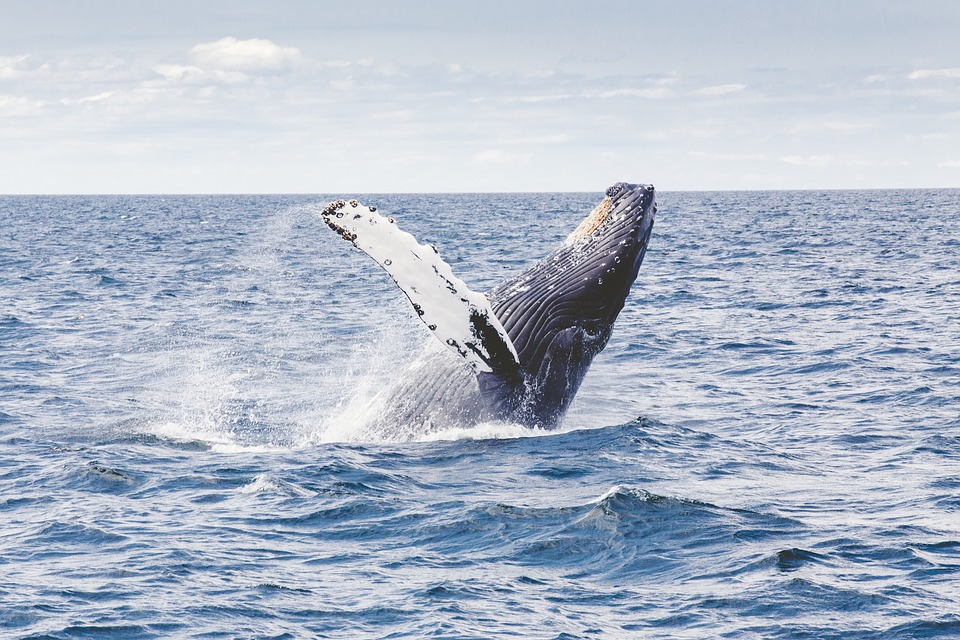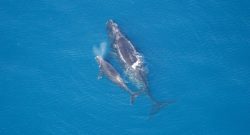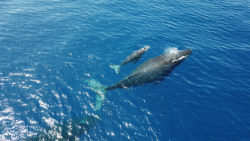
Whale Poop and Climate Change: Here’s What You Need to Know
When you watch a whale majestically breaching the ocean’s surface, spraying a million sparkling droplets of crystalline water in every direction, we bet you’ve never asked yourself: Hmmm, I wonder how much whale poop there is in that spray.
No one can blame you for that– it’s a little gross. Whale poop affords incredible benefits to marine ecosystems and the health of our planet, though.

Two endangered right whales in Stellwagen Bank National Marine Sanctuary. Photo: NOAA
Ecosystem Engineers: So Just Why Are We Talking About Whale Poop?
Marine biologist Asha de Vos really cares about whale poop. Not just because it comes from her favorite mammals, the majestic whales that travel the oceans blue, but also because it is a major engine for climate stabilization.
“Whales are ecosystem engineers,” she explains in her TED Talk. “They help maintain the health and stability of the oceans, and even provide services to human society.”
How does this work?
“As whales dive to the depth to feed and come up to the surface to breathe,” de Vos says, “they actually release these enormous fecal plumes. This whale pump, as it’s called, actually brings essential limiting nutrients from the depths to the surface waters, where they stimulate the growth of phytoplankton, which forms the basis of all marine food chains.”
Whales are some of the longest-migrating animals on the planet. They eat nutrients in one place, then release them – again, in the form of poop – in new places that they travel. They also distribute their nutrient rich poop near the ocean’s surface when they return from diving, which promotes the growth of phytoplankton.
“Clearly whales are very important in nutrient cycling, both horizontally and vertically, in the oceans,” says de Vos.
She’s not the only one who believes in their importance, either. As one study from the University of Vermont found, “A review of research on whales shows that they have more a powerful influence on the function of oceans, global carbon storage, and the health of commercial fisheries than has been commonly assumed. The continued recovery of great whales from centuries of overhunting may help to buffer marine ecosystems from destabilizing stresses, including climate change.”

Humpback whale mother and calf in the warm waters of Hawaiian Islands Humpback Whale National Marine Sanctuary. Photo: J. Moore/NOAA, under MMHSRP permit #20311
Carbon Sequestration: Whale Poo Feeds Green Machines
Did we mention that whales can do so much to aid in the process of carbon sequestration? This is where the importance of those little phytoplankton come in: they’re carbon fixers, which means that they breathe carbon dioxide in from the atmosphere, then use it to build their bodily structures. When these plankton die or are eaten, they carry the carbon with them, keeping it out of the atmosphere.
Moreover, de Vos points out, whale carcasses are some of the largest forms of detritus – waste or debris – in the entire ocean. When they fall to the seafloor, they feed entire scavenging species on the seafloor like crabs, worms, and clams. They thus nurture new generations of deeper sea animals, themselves constituting important parts of the food chain.
Plus, even more carbon sequestration, she adds: “Whale carcasses transport about 190,000 tons of carbon, which is the equivalent of that produced by 80,000 cars, per year, from the atmosphere to the deep oceans.” This is why it is so important to protect individual whales and protect their populations.
As the University of Vermont study points out, protecting and promoting whales could even enhance our fishing industries, as it “could lead to higher rates of productivity in locations where whales aggregate to feed and give birth.” Considering the trouble in which our fisheries find themselves, this alone is an excellent reason to sit up and take notice.
Time to Make a Change: Let’s Save the Whales … Again
It’s time we do as Asha de Vos urges, and work to save the whales not for their sake, but for ours. (And also, hopefully, for theirs.) So next time you see a gorgeous whale dance, with pod member after pod member breaching and landing in a shining spray, remember to think about whale poo. The climate will thank you.
